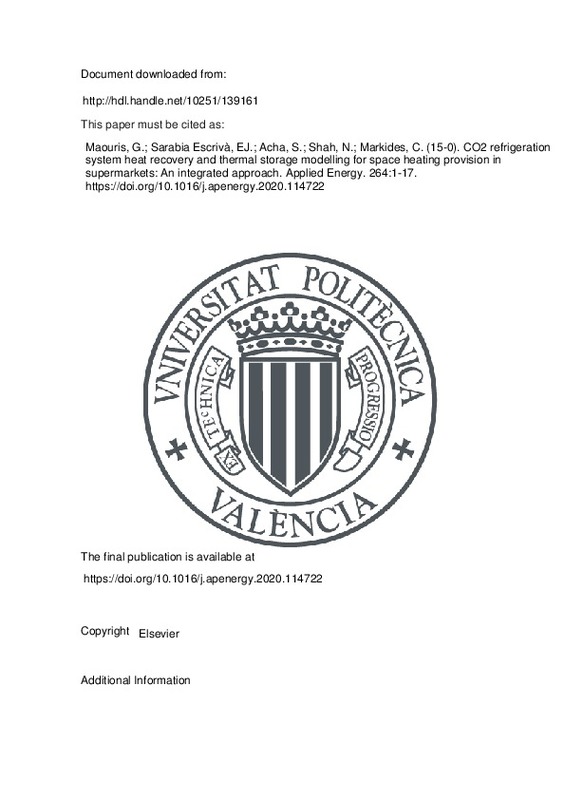JavaScript is disabled for your browser. Some features of this site may not work without it.
Buscar en RiuNet
Listar
Mi cuenta
Estadísticas
Ayuda RiuNet
Admin. UPV
CO2 refrigeration system heat recovery and thermal storage modelling for space heating provision in supermarkets: An integrated approach
Mostrar el registro sencillo del ítem
Ficheros en el ítem
| dc.contributor.author | Maouris, Georgios
|
es_ES |
| dc.contributor.author | Sarabia Escrivà, Emilio José
|
es_ES |
| dc.contributor.author | Acha, S.
|
es_ES |
| dc.contributor.author | Shah, N.
|
es_ES |
| dc.contributor.author | Markides, C.
|
es_ES |
| dc.date.accessioned | 2020-03-23T08:46:21Z | |
| dc.date.available | 2020-03-23T08:46:21Z | |
| dc.date.issued | 2020-04-15 | es_ES |
| dc.identifier.issn | 0306-2619 | es_ES |
| dc.identifier.uri | http://hdl.handle.net/10251/139161 | |
| dc.description.abstract | [EN] The large amount of recoverable heat from CO2 refrigeration systems has led UK food retailers to examine the prospect of using refrigeration integrated heating and cooling systems to provide both the space heating and cooling to food cabinets in supermarkets. This study assesses the performance of a refrigeration integrated heating and cooling system installation with thermal storage in a UK supermarket. This is achieved by developing a thermal storage model and integrating it into a pre-existing CO2 booster refrigeration model. Five scenarios involving different configurations and operation strategies are assessed to understand the techo-economic implications. The results indicate that the integrated heating and cooling system with thermal storage has the potential to reduce energy consumption by 17¿18% and GHG emissions by 12¿13% compared to conventional systems using a gas boiler for space heating. These reductions are achieved despite a marginal increase of 2¿3% in annual operating costs. The maximum amount of heat that can be stored and utilised is constrained by the refrigeration system compressor capacity. These findings suggest that refrigeration integrated heating and cooling systems with thermal storage are a viable heating and cooling strategy that can significantly reduce the environmental footprint of supermarket space heating provision and under the adequate circumstances can forsake the use of conventional fossil-fuel (natural gas) boiler systems in food-retail buildings. | es_ES |
| dc.description.sponsorship | This research was supported by funds provided via the Imperial-Sainsbury s Supermarkets Ltd. partnership. This work also was supported by the UK Engineering and Physical Sciences Research Council (EPSRC) [grant number EP/P004709/1]. Emilio J. Sarabia gratefully acknowledges financial support from Universitat Politècnica de València Fellowship. Data supporting this publication can be obtained on request from cep-lab@imperial.ac.uk. | es_ES |
| dc.language | Inglés | es_ES |
| dc.publisher | Elsevier | es_ES |
| dc.relation.ispartof | Applied Energy | es_ES |
| dc.rights | Reserva de todos los derechos | es_ES |
| dc.subject | CO2 refrigeration | es_ES |
| dc.subject | Supermarkets | es_ES |
| dc.subject | Heat recovery | es_ES |
| dc.subject | Thermal storage | es_ES |
| dc.subject | Natural refrigerants | es_ES |
| dc.subject | Integrated heating and cooling | es_ES |
| dc.subject.classification | MAQUINAS Y MOTORES TERMICOS | es_ES |
| dc.title | CO2 refrigeration system heat recovery and thermal storage modelling for space heating provision in supermarkets: An integrated approach | es_ES |
| dc.type | Artículo | es_ES |
| dc.identifier.doi | 10.1016/j.apenergy.2020.114722 | es_ES |
| dc.relation.projectID | info:eu-repo/grantAgreement/UKRI//EP%2FP004709%2F1/GB/Energy-Use Minimisation via High Performance Heat-Power-Cooling Conversion and Integration: A Holistic Molecules to Technologies to Systems Approach/ | es_ES |
| dc.rights.accessRights | Abierto | es_ES |
| dc.contributor.affiliation | Universitat Politècnica de València. Departamento de Termodinámica Aplicada - Departament de Termodinàmica Aplicada | es_ES |
| dc.description.bibliographicCitation | Maouris, G.; Sarabia Escrivà, EJ.; Acha, S.; Shah, N.; Markides, C. (2020). CO2 refrigeration system heat recovery and thermal storage modelling for space heating provision in supermarkets: An integrated approach. Applied Energy. 264:1-17. https://doi.org/10.1016/j.apenergy.2020.114722 | es_ES |
| dc.description.accrualMethod | S | es_ES |
| dc.relation.publisherversion | https://doi.org/10.1016/j.apenergy.2020.114722 | es_ES |
| dc.description.upvformatpinicio | 1 | es_ES |
| dc.description.upvformatpfin | 17 | es_ES |
| dc.type.version | info:eu-repo/semantics/publishedVersion | es_ES |
| dc.description.volume | 264 | es_ES |
| dc.relation.pasarela | S\404699 | es_ES |
| dc.contributor.funder | Engineering and Physical Sciences Research Council, Reino Unido | es_ES |
| dc.contributor.funder | UK Research and Innovation | es_ES |







![[Cerrado]](/themes/UPV/images/candado.png)

